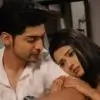Folks,
For over a week now, you have all been having an unexpected holiday from me, thanks to the virtual baby track, and I hope you made the best of the extra free time !
Unmitigated tripe: The fact was that I was, in that order,
- bemused, and quite put off, by the idea that the fate of the Mughal empire was dependent on the precise colour of Jodha Begum's digestive excretions.😉 The one thing that the CVs forgot to specify was: Which blue? Sky blue, midnight blue, cerulean blue, new blue? One does not know, and meanwhile, I thanked my lucky stars that they forbore from presenting us with the grisly evidence, ugh...!
-fatigued by all the raging battles in the forum over the relative culpability of Jodha and Jalal, whereas the goings on reminded me of nothing but a French farce: Did Jalal do IT or did he not do IT, and last of all, did he and she do IT!?!
Then by the furore over Jodha's off the cuff statement that she would leave her baby behind and depart from Agra , presumably to settle in Mathura and plague her long suffering Kanha even more, seeing that Amer would be off limits even for a self-parityakta. 😉A statement which I am sure she never really meant. If the foolish girl would only talk about half of what she does, or even less, life would be far easier for her and for us! 😉
-even more put off by Jodha's permanently sullen, puffed up visage , and the excessive demands she was making on the studio's glycerine stock. And most of all by her monotone reactions, which never seemed to change, no matter if it was Salima dishing out distilled wisdom to her, or she herself was repeating to her imperial husband, for the umpteenth time, that she had double or triple ghrina for him. She then proceeded to surpass herself when she made a very unbecoming comment about Jalal and that baandi; I could not believe my ears when I heard it.
My heart went out more than ever to poor Paridhi, locked into the straightjacket of this acutely frustrating character, when she could, given a free hand, have been a splendid combination of a Diana and a Juno, who could bring even an arrogant , turbulent emperor to heel. As it was, as loveanime put it best fully 3 weeks ago, "Jalal has gone so forward in character development that he is walking alone, and his apparent soul mate is nowhere near him". I could practically see the CVs tearing their collective hair, wondering what to make now of their tagline Jalal ko Jodha ne haivaan se bana diya insaan.😉
Whodunit?:There followed all the cloak and dagger (literally, when it came to the poor Hakima Sahiba) stuff, where I was seriously disappointed that the body did not, in the classic whodunit style, tumble out of a cupboard on to the unsuspecting Salima Begum. 😉Instead, it was decorously laid out on the floor, with next to no blood in sight, probably because it was not considered appropriate to bring on the tomato ketchup in an 8 pm family' show (never mind all the distinctly adult passages about the virtual baby!).
Finally, the terrific confrontation between Jalal and Bakshi Banu, where Rajat, as Jalal, pulled out all the stops in his magisterial handling of of a very demanding scene. Time and again, the boy manages to go beyond the script, and brings out nuances that might never have occurred to the writer. Even on the fourth rewatching, when, after the hug and the (genuine and infinitely tender) kiss on her head, he moves away and asks Bakshi Banu Aap hi ne Jodha Begum jo wo ark pilaya tha na?, the expression in his eyes simply blew me away - they were so still and knowing and so very, very sad. Then he slowly builds up steam, his words tumbling over each other in a crescendo of anguish. It was microcontrolled and incredibly effective, and yet he never went over the top. Amazing.
Jodha: Re-orientation:The follow up to this, in last night's episode, was already promising. Even if Jodha was using up still more glycerine, she was not mahaan and instantly forgiving with Bakshi, which was already a relief. And she was, at very long last, for the first time after the Green Jodha- Yellow Jodha scene, actually doing some introspecting.
Most important, she had, wonder of wonders, come to the conclusion that she had been wrong and very unjust to Apne niraparadh Shahenshah. I cleaned out my ears and rewatched it, but yes, it was Apne. Holy smoke! I said to myself, What has got into the girl?
The wonders did not cease there. When she went tripping into Salima Begum's rooms to thank her, Jodha, radiant in golden yellow, looked like an ambulant sunflower. She was such a treat to eyes lacerated by her dismal looks and worse expressions of late, that I was prepared to forgive her for at least 70% of all her manifold follies of the last several weeks! See the unfair advantages of being such a gorgeous looker!
She looked suitably chastened and receptive as Salima Begum advised her about the nazakhat of the shauhar-biwi ka rishta, adding that she was sure Jodha knew how to behave with her husband. This was manifestly a white lie, for this is the very last thing Jodha knows,😉 but the point was made and, more important, taken. And so on to the Jodha-Jalal scene.
Study in contrast: When I watched it, what hit me was the difference between Jalal and Jodha in terms of both complexity and depth of character. Jodha is like a brisk, gurgling stream flowing over a bed of pebbles. The water is pure and clear and you can see right thru to the bottom. What you see is what you get. There are no treacherous eddies, no underwater currents to drag you in. But there is also much less gravitas, less depth, less subtlety. It babbles on, this brook, unconscious and uncomprehending of any world but its own simple, and simplistic, one.
Jalal is like the ocean, where the tides rise and fall, and storms whip up savage waves, or even a tsunami. There is almost unlimited power, both to hurt and to heal, but there are also unplumbed depths - depths of feeling, of hidden heartache, of an ever present loneliness that hurts the soul.
There is no comparison possible between the two at all.
This came thru with startling clarity in their scene together. Jodha's understanding is limited to what concerns herself. Her undoubtedly heartfelt regret, and the gratitude she now feels towards him, are both again only related to what she did wrong - in so gravely misjudging him when he was doing so much to protect her reputation and secure justice for her, whereas, as she says herself, she was busy demeaning herself by maligning him more harshly than ever before.
What moves her deeply is his simple affirmation of his trust in her, and perhaps even more so his saying that he does not know why he trusts her, why he believes in her purity of mind and body, her integrity. Her eyes brim over with grateful tears as she thanks him with folded hands, and this gratitude is not just for what he has done to defend and restore her reputation.
It is as much for lifting from her soul the burden of not being able to reciprocate the affection or love he might be thought to feel for her, by assuring her that nothing of what he did for her was out of mohabbat for her.. The relief in her sudden smile as he says this is like the sun coming out of the clouds, and she nods her head in happy acknowledgement
During this entire passage, Jodha clearly has no notion of what Jalal is going thru, of how his innermost feelings are being put thru a wringer. She does not have the imagination, the perceptiveness, to feel his anguish and the horrendous dilemma he is facing. She cannot understand how it feels to be betrayed by a dearly loved sister, the terrible sense of alienation that it creates; she sees it simplistically, as a case to be solved by magnanimous forgiveness. And even here, she has no idea of the implications of a pardon in terms of the very bad precedent it will set and the damage it will do to the image of Mughal justice and of imperial governance.
This is not to blame Jodha. She is what she is, a clear, flowing stream, transparent and unaware of what all can lie beneath deep, still waters. In time, she will learn, but that time is not yet. When she gets there, she too will feel pain that is not hers as deeply as if it was her own. That will be her introduction to the perils of human bondage. At least, I hope so, for this is to be a love story, and without such symbiosis, there can be no true love.
Jalal: Of the human condition: If one was to look for a template of the unexpected tragedies of the human condition, and the misery that unconditional love can bring in its wake, one need go no further than Jalal last night.
In the scene when he turns, instinctively, to his Badiammi for solace from the anguish that wracks him, Jalal turns you inside out with the depth of his pain and his sense of abandonment and betrayal. His last sentence, as he weeps on his Badiammi's shoulder, that whether the brother in him wins out or the Shahenshah, shikast to hamari hi hogi , cuts one to the quick. He is bleeding inside, from the deepest and most poisonous of cuts, those inflicted not by the enemy outside, but by the enemy within, hidden behind the mask of a near and dear one.
Some have wondered why he goes to Mahaam. But where else would he go? Not to Hamida, who was not there for him when he lost his Khan Baba, nor when he was crushed by the loss of his unborn child. His Badiammi hs been his refuge from every storm since he was a child, hunted and driven from one temporary refuge to another.
And whatever Mahaam might scheme and plot to benefit Adham (and I personally do not believe she ever really contemplates his ascending to the throne, least of all by getting rid of Jalal, as she tells him plainly after the butparasti crisis with the maulvis), there is not the least doubt that she loves her erstwhile nursling, and will fight to defend him against all comers.
Unlike Jodha, or even Hamida, Mahaam Anga understands perfectly ki Jalal abhi kis daur se guzar raha hai, and the two are literally symbiotic in their emotions. Her eyes reflect this empathy, as do the tactile affection, the hug, the cradling him in her arms and soothing him, her own voice breaking under the emotional stress that is, for the moment, genuine and deeply felt. Rarely has the special quality of their relationship come thru so clearly.Together, they just blew me away.
As for the beautifully written scene with Jodha, Jalal walks off with it effortlessly. The tired, detached look on his face as she comes in, most of his mind elsewhere as he drags himself back to the here and now. The candour and directness, devoid of any sentimental overtones or undertones, with which he explains why he, who trusts no one, yet trusts her. The matter of fact generosity with which he brushes aside her apology as unnecessary.
The deliberate assertion that he did all this not out of love for her, but in order to demonstrate that no one, but no one, could malign a begum of the Shahenshah and get away with it.
He might very well be sincere in this statement, and I myself believe he is. Or then again he might not. His face, after Jodha has left, betrays nothing, and there is no revealing soliloquy.
Whichever it is, he clearly intends to put her at ease and prevent any awkwardness in her future interactions with him. That despite his distraction and emotional trauma, he can still find it in him to think of how to put Jodha at ease is further proof of his sensitivity, rare in such an alpha male, and his ability to gauge the feelings of another person. The relief in her face, and the cheerful smile with which she receives this assertion, show that Jalal has achieved what he set out to do.
But it is clear that in the whole of this scene, not even half his mind is on Jodha, and his nod of acknowledgment as she thanks him profusely before leaving is visibly abstracted. He is preoccupied with the one gnawing question that continues to torment him: What should he do about Bakshi Banu? Such are the shackles of human bondage.
Bakshi Banu: Malignant love: Bakshi Banu was a revelation last night, and her character took a giant leap towards hitherto unimagined complexity and hitherto unsuspected facets. She was the real surprise package, and I was fascinated with her. Not that I had any sympathy for her, but I can see where she is coming from.
Which is more than the simple Jodha, who has never encountered obsessive love, not to speak of such malignantly obsessive love, can comprehend. The patent bewilderment with which she consults Salima, her go to' person from now on, would be amusing if it was not so sincere. (NB: As for Jodha's unguarded comment about her having cared for Suryabhan, even if not as much as Bakshi Banu does for her husband, it would have been most ill-advised if she had said it to anyone but Salima. Not even Hamida Banu would have taken it well; not in those days, and not even today. Perhaps it was meant to show the depth of the trust that Jodha has in Salima, and how comfortable she feels with her).
To revert, contrary to earlier assumptions, Bakshi Banu is not a victim of the society she lived in. When she confesses that she loves her (wife beater of a) husband in a beinteha fashion, and is ready to both die for his sake and kill for his sake, she is speaking not just for the past, but for the future as well. .
So it is not the beaten woman syndrome at all. It is deliberate, and she is one of those women in whom the love of a man outweighs all other loves and all other loyalties. It is very difficult to comprehend, this kind of abject emotional subjugation to a man who cares not a jot for her and who abuses her physically and emotionally, but such women do exist, and not just in such ages gone by. They are around us even today, and the Bakshi Banus of the world are a reality check for all the rest of us who imagine the education and empowerment would have eradicated such crippling human bondages.
Ruqaiya: The heart has its reasons: As Ruqaiya sets out to shed the shackles imposed on her by Jalal's earlier aversion for any mention of mohabbat in their relationship, and to win his heart as well as his mind, she is again making a fundamental mistake, of ignoring and dismissing uncomfortable possibilities. Hoshiyaar is as amazingly perceptive in his summing up of what Jalal might be feeling for Jodha, as he is ill advised in voicing it, and as Ruqaiya is in brushing it aside. It might not come just yet, indeed not for a while yet, but the time will come when Jalal's Gatti will realise that Jalal's heart is no longer hers to claim.
As I had written earlier, I do not know if, once that realization dawns on her, the innate integrity she revealed when she slapped Hoshiyaar and was prepared to rejoice in the arrival of Jalal's child even if it was not hers, will make her more amenable to Jalal coming to love Jodha, while still caring for his Gatti as before (which is a given). That is a toss up, for she has never seen Jalal in love with another woman, and the sense of loss, and the longing to be loved by him that will be stirred up afresh, will be something she has never known before.
If yesterday was any indication, will try hard to both win Jalal for herself and to keep him away from Jodha, and if the CVs, as is their wont, opt for crass melodrama, we are in for a crude jealousy track. It will be sad to watch one more tale of human bondage that corrodes and distorts.
The precap: Jalal is speaking as the Shahenshah, and he states what is the very underpinning of credible justice, that family ties cannot be allowed to influence a sentence. He adds that it was in order to avoid given any impression that his relationship with the accused was muddying the waters, that he had left it to Jodha to decide on the punishment for Bakshi Banu.
It seems that Jodha has now lobbed the ball back into Jalal's court and wants him to pardon Bakshi Banu too, as she has done, and forgive her because she is his sister. Whereupon he responds with brutal harshness Hargiz nahin karenge.
Characteristically, Jodha is not taking into account the danger in the Shahenshah setting such a precedent. If Jalal lets Bakshi Banu off scot free, what will he do the next time a private citizen stands accused of a serious crime? Let that person off too? And what will his reputation be if he is seen to be so partial to his own family that he throws to the winds the bedrock principle of justice being blind? Public faith in Mughal justice will collapse. He cannot be seen to be favouring his sister so blatantly.
I think he will end up banishing Bakshi Banu, as she has no blood on her hands,and the person most affected, Jodha, has forgiven her. In Islamic jurisprudence, there is, as I had mentioned and Sara has confirmed, the option, even in cases of murder, of a compromise settlement between the accused and the victims of the crime, even a full pardon, which can then be approved by the court. Maybe she might even be let off if Jodha specifically insists on that. Let us see.
Shyamala B.Cowsik
PS: This might now seem redundant, but it is not really so, as it has clear implications for the future of the Jalal-Jodha relationship. I am referring to Jalal's Rabelaisian explanation, during that walk with Jodha in the corridors, for why he (or rather she + he ) did IT.
To my mind, Jalal was on a fishing expedition with that elaborate piece of bluff on Jodha, and he netted a big one, in the sense that Jodha exposed herself far more than she had ever done before. He was trying to get her to consider the idea that, for all her constant ranting about her ghrina for him, she too might be physically attracted to him. No other explanation holds water,as Mansi has elaborated in her thread on that episode.
In fact, for me, that was the single most revelatory part not just of that episode, but of the past several ones, as far as the inner workings of Jodha's mind are concerned, for we have NO idea of what she is thinking given that there are no voiceovers.
She is not afraid of Jalal, she is afraid of herself. She is afraid, above all, once he has finished his Puckish recital, of what she felt or did not feel, and what she did or did not do. She is not at all sure he is lying, and that is what shocks her to the core.
So there is hope yet for our ice maiden!😉





































68